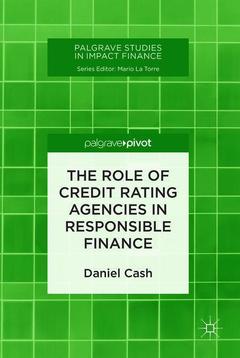Description
The Role of Credit Rating Agencies in Responsible Finance, 1st ed. 2018
Palgrave Studies in Impact Finance Series
Author: Cash Daniel
Language: English
Subject for The Role of Credit Rating Agencies in Responsible Finance:
Support: Print on demand
Description
/li>Contents
/li>Biography
/li>Comment
/li>
This Palgrave Pivot aims to examine the bourgeoning relationship between the Principles for Responsible Investment and the Credit Rating Industry. Since May of 2016, when the partnership was initially publicised, the PRI have endeavoured to incorporate Credit Rating Agencies into its initiative via its ?ESG in Credit Ratings Initiative?, and have been working diligently to find, and create common ground between Credit Rating Agencies and Institutional Investors seeking to be more forward-looking in their investment approaches. However, in recent years the ?Big Two? Credit Rating Agencies ? Standard & Poor?s and Moody?s ? have finally received record fines for their conduct in the run-up to the Financial Crisis. There is a need, then, to examine the incorporation of the Credit Rating Agencies into such a progressive initiative. To achieve this objective, this book examines the field of ?responsible investing?, the credit rating industry, and the power dynamic that exists betweenthe rating industry, investors, and the PRI (via its ?Initiative?).
Daniel Cash is a Lecturer in Law at Aston University. Daniel completed his PhD in Durham University in 2016, and his research is exclusively concerned with the Credit Rating Industry. He has written extensively on the subject, and is the author of a number of articles and Regulation and the Credit Rating Agencies: Restraining Ancillary Services.
These books may interest you

Public Credit Rating AgenciesIncreasing Capital Investment and Lending Stability in Volatile Markets 116.04 €

A Century of Sovereign Ratings 94.94 €


